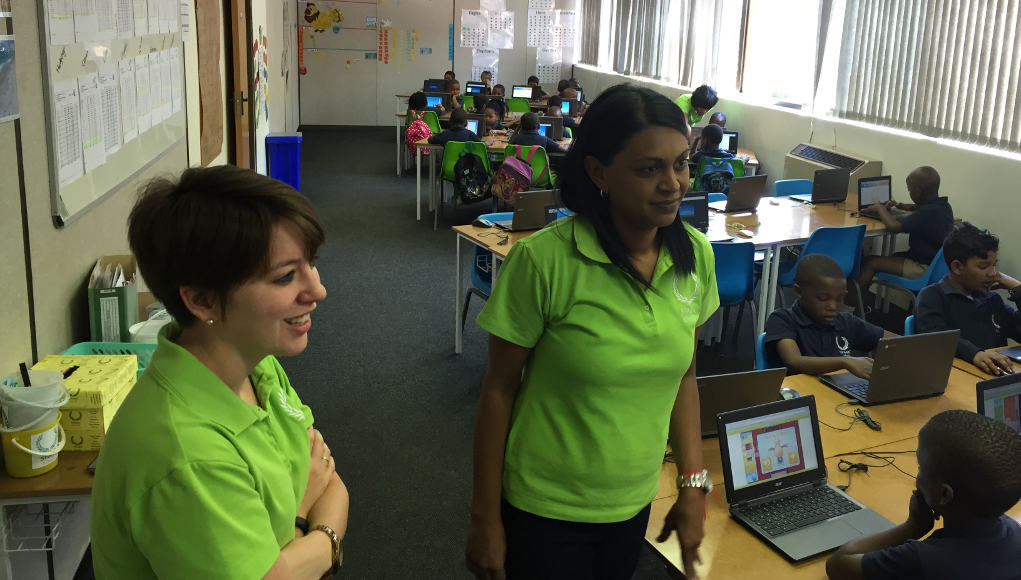Teaching Core Values

Bailey Thomson was a TFA teacher at the original Rocketship school in the Bay Area. When two MBAs from South Africa visited in 2012, Thomson introduced herself. When she learned that they were planning the first blended learning model in South Africa to “provide quality education at a cost that the country can afford” Thomson didn’t wait for an offer. She told them she was joining them for the school launch in Johannesburg.
Five years later, Bailey Thomson is Director of School Operations for SPARK Schools with 11 schools (and plans to expand again in 2018) in South Africa. She gave a talk at TEDxJohannesburg in November about the significance of teaching core values to students.
“Here’s our secret: we teach core values as deliberately as we teach algebra or reading comprehension,” Thomson said. “We believe that what students learn to value will drive their behaviors through and beyond school, propelling them to globally-engaged citizenship well into adulthood. And with the right values internalized, students will achieve as a result of their strength of character, not develop character as an afterthought when time allows in the final weeks before school ends each summer.
Core values are so integral to the identity of SPARK that its name is actually an acronym of the five core values the school focuses on teaching students:
Service. “During our daily community gathering, our scholars pledge to serve their classmates, community, and country. They participate in meaningful service projects, including cleaning up local parks, collecting and distributing water during the drought, and volunteering at local orphanages. They assist struggling classmates. They learn about and commit to bettering South African society. Each year on Heritage Day, our students wear their family’s cultural dress and share food and traditions with their peers, recognizing that service to country often begins with recognition of the beauty of diversity.”
Persistence. “We buy into the value of grit in both our staff and our students. This, we believe, is the key to achievement. Our blended learning model, in which we integrate technology into traditional teaching, employs software that emphasizes failing a certain amount of times before succeeding. Our educators are recruited on their track record of persistence through challenge, both personally and professionally.”
Achievement. “In our daily creed, our students promise to achieve their best in all that they do. Each year, we celebrate Youth Day as University Day in our schools, and our students spend that day visualizing their path to tertiary education and careers of their choice and hearing from community members about the unique and exciting jobs they have chosen. Our students also have great examples in our staff members who are selected from thousands of applicants annually and who work unbelievably hard to drive student achievement.”
Responsibility. “This value strikes me as especially important given the state of politics in South Africa, and in my home country, and across the world at this time. Imagine a generation of students who had promised each morning of their school career to be responsible for their actions and who were encouraged to hold themselves, their peers, and their teachers to account on that point. Our students are well-versed in tools for conflict resolution and are as capable of using their words to speak their mind as they are in using their words to apologize.”
Kindness. “Nothing soft about it. Our students aren’t simply nice. They treat all their peers with respect and dignity. They believe in the worth of their peers, no matter their socioeconomic background or the color of their skin.”
“As blended learning models are springing up in SA, I think we’ve finally identified our culture and values as our differentiator, which in turn facilitates the success of our model and achievement of our students.”
For more, see:
- Innovative Blend Could be the Spark for South Africa
- What If We Replaced Family (and Classroom) Rules with Core Beliefs?
- Supporting Student Agency of SEL
Stay in-the-know with all things EdTech and innovations in learning by signing up to receive the weekly Smart Update.











0 Comments
Leave a Comment
Your email address will not be published. All fields are required.